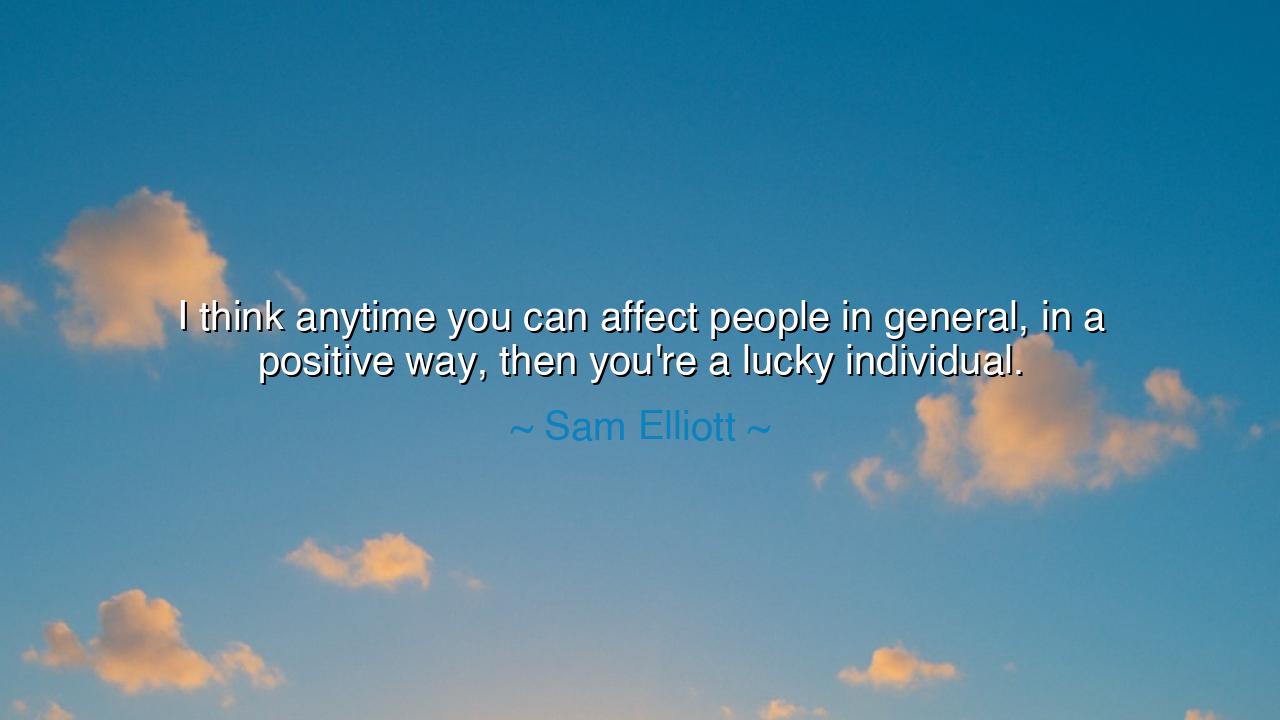
I think anytime you can affect people in general, in a positive
I think anytime you can affect people in general, in a positive way, then you're a lucky individual.






The words of Sam Elliott—“I think anytime you can affect people in general, in a positive way, then you're a lucky individual.”—carry the weight of humility and the wisdom of a soul who knows the fleeting nature of fame and fortune. They remind us that true greatness is not measured in wealth, trophies, or applause, but in the unseen ripples of influence one leaves upon the hearts of others. To affect people in a positive way is not merely an act of kindness—it is to touch eternity, for the good we plant in others outlives our names, our bodies, and even our age.
The ancients cherished this truth. The Stoics, from Epictetus to Marcus Aurelius, often spoke of the duty of man not to seek glory for himself, but to live in harmony with others, to improve their lives through virtue. Aristotle declared that man was a political, communal creature, meant to live not in isolation but in service of the greater good. Elliott’s words echo this timeless wisdom: the measure of one’s fortune is not in how much one gathers, but in how much one gives that lifts another’s spirit toward light.
History gives us shining examples of this principle. Consider Florence Nightingale, who, in the blood-soaked fields of the Crimean War, transformed the practice of nursing. She did not seek riches or renown, yet her tireless work saved countless lives, and her reforms reshaped medicine for generations. Was she “lucky”? By the world’s standards, her life was one of hardship and sacrifice. Yet by Elliott’s measure, she was among the most fortunate of all, for she affected humanity in a positive way, leaving behind a legacy of healing that endures to this day.
Elliott’s use of the word lucky also holds deep meaning. It acknowledges that the opportunity to influence others for good is not always within our control. Life may grant us a platform, a moment, or a chance encounter where our words or deeds carry weight. To be present in such moments, and to act with kindness, is a blessing beyond measure. For many live and die without ever realizing the power they could wield for another’s betterment. To recognize this and embrace it is to live consciously, gratefully, and nobly.
Yet this wisdom does not belong only to the great names of history. It belongs to the teacher who encourages a child, the neighbor who comforts the grieving, the friend who inspires another to keep going when despair has nearly won. These acts may never appear in chronicles, but they shape lives. To live so that even one soul walks lighter because of you is to fulfill the highest calling of life. In this way, each of us may become, as Elliott says, “a lucky individual.”
The lesson for us is both simple and profound: seek not only success for yourself, but significance in the lives of others. Look each day for ways to affect people positively—through compassion, encouragement, truth, or example. Do not underestimate the smallest of actions, for sometimes a single word spoken in kindness can change the course of another’s destiny. To live with this awareness is to live with purpose, and to carry fortune greater than gold.
So, dear listener, let Sam Elliott’s words settle deep within you. Remember that luck is not the prize of chance, but the gift of meaning. You are most fortunate not when you hold riches in your hand, but when you have planted goodness in another’s heart. Strive, then, to live each day so that your influence becomes a blessing, and your memory, when you are gone, will be a beacon. For to affect others positively is not just to be lucky—it is to be truly alive.






TKTran Kiet
This quote highlights the value of contributing positively to others’ lives. How do people recognize when their actions have a meaningful effect, especially in subtle or long-term ways? I also think about the balance between intention and perception—what one person sees as positive might not always be perceived that way by others. Could cultivating self-awareness and empathy enhance the likelihood of creating genuinely positive experiences for those around us?
NAPhan Thi Ngoc Anh
I’m intrigued by the idea that positive influence is a form of luck. Does this imply that the ability to make a difference is something outside one’s control, or can it be actively cultivated through effort, compassion, and awareness? I also wonder how this mindset affects motivation—does it inspire people to seek opportunities to help others, or could it foster a sense of inadequacy in those who feel their impact is limited?
HVTran Hoang Vu
This statement prompts reflection on the moral dimensions of everyday actions. Can consistently striving to influence others positively create a more fulfilling life, or is there a danger of becoming overly focused on validation from others? I’m also curious how intention and outcome intersect—does the positive impact matter more than the intent behind the action, or are both equally important?
HLLe Thi Huyen Luong
Reading this makes me think about the intersection of luck, opportunity, and responsibility. Is being able to positively affect others purely a matter of circumstance, or does personal choice play a major role? I also question whether recognizing this luck encourages humility and gratitude. How do people maintain awareness of their influence without becoming arrogant or self-congratulatory?
QAdinh ba quoc anh
I find this perspective inspiring because it frames life’s purpose in terms of impact on others. How does one measure the effect of their actions in a meaningful way? Are public figures more likely to experience this type of ‘luck’ due to visibility, or can ordinary people also create profound positive change in their communities? I also wonder how cultural context shapes what is considered a positive influence.